Post by yerblues1968 on Jun 8, 2008 19:25:29 GMT -5
SID BERNSTEIN: THE MAN WHO BROUGHT AMERICA TO THE BEATLES
nyrock.com
by Glyn Emmerson
May 2001
Sid Bernstein – the man who brought The Beatles to America – has a new book out titled Not Just the Beatles, detailing his life from within and without his long career in the music business.

Back before MTV, when artists actually performed rather than lip-syncing their shows to pre-recorded music, Sid was the first person to stage a major rock act at a stadium. The roster of bands he has promoted is a virtual who’s who of popular music in the twentieth century: Judy Garland, Tony Bennett, the Rascals, the Rolling Stones, the Blues Project, Hendrix, Joplin, Sinatra, Grand Funk Railroad, Bay City Rollers, Laura Branigan, to name a few.
From losing his virginity on the grassy knolls of Prospect Park in Brooklyn (it’s in the book!) to battling the Germans in World War II, Sid seems the proverbial man who has done it all. Gentle, mild mannered and ever so courteous, he has fathered six children, brought the British invasion to America, and much more (Sid’s current projects include fund raising for cancer research).
Not Just the Beatles is a breezy, conversational read, in which the stories flow as if you were hearing them from an old friend. A rapturous mix of musical adventures, the book glows with an underlying sense of optimism, whimsical love and caring for the world.
NY Rock’s Glyn Emmerson sat down with Sid over a few cups of apple cider and chatted about all things Sid, and, of course, the Beatles.
NYROCK:
How did you find out about the Beatles?
SID:
In 1962, I was taking a course at the New School for Social Research on 12th Street where I now teach a course on the music biz. For the course, the professor mentioned a bunch of books for us to get as well as some English papers to read. I didn't have time to read the books, [so I picked] up the English newspaper that was a very thin airmail edition. This was the right time to be reading an English newspaper. So here I am reading little stories about this group from Liverpool that is causing a lot of hysteria. By the end of the course, I was so Beatle-ized by what I read, even though I did not hear a note, I said, gotta get 'em. I'd been promoting concerts at the Brooklyn Paramount, where I took over from Alan Freed because he got into a lot of trouble for payola. Murray the K was my MC and they were hot shows.
I called Brian Epstein at home, who was still living in Liverpool, got him on the phone and tried to sell him on the idea of the Beatles coming over here. He said, "America is not playing our records. I don't want my boys to play to an empty house. We are superstars here." He told me I was the first American to call him, even before Ed Sullivan. I won him over by saying, 'I'll put your boys in Carnegie Hall."

I did not hear the Beatles music until they started to hit radio and that was in September of 1963.
NYROCK:
First impression of the Beatles?
SID:
I thought they were great! I met them at the Plaza Hotel. They were ordinary nice guys who couldn't believe what was going on in America. They couldn't believe as they looked out the window of the Plaza that people were downstairs singing their songs and waving to them. They said we don't even have this sort of reaction in our own country.
NYROCK:
Did you help the Beatles get on "Ed Sullivan"?
SID:
Ed Sullivan had the band on Sunday; I had them on Wednesday, Lincoln's birthday. He put them on when he heard an American promoter had them for February 12, 1964. He put them on three days before Carnegie, on February 9th. Talk about good luck! People thought I was a genius. He also got caught up in the frenzy and signed them to his show before they had a hit, as I did.
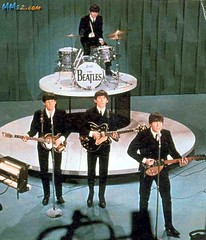
The Beatles on The Ed Sullivan Show.
NYROCK:
Was that the first rock concert at Carnegie Hall?
SID:
Yes, they weren't too happy about the Beatles. But they asked me not to come back after the Rolling Stones played Carnegie.
NYROCK:
Were the Carnegie Hall shows recorded?
SID:
No.

Paul McCartney and Sid Bernstein. Photo by Steve Sherman taken at
Carnegie Hall after a performance of Paul's Liverpool Oratorio, 1991
NYROCK:
What was the difference between the Rolling Stones and the Beatles crowds?
SID:
The physical reactions of the crowd. The Beatles crowd was pretty little girls and kids. For the Rolling Stones, people were getting on top of their chairs.
NYROCK:
How did you get the Beatles to play Shea Stadium?
SID:
The manager of the ticket window at Carnegie Hall told me I should have brought the Beatles for 30 days instead of the 2 shows at Carnegie. He gave me the idea for the Shea show. I had discussed with Brian the possibility of the band playing the old Madison Square Garden after the Carnegie shows and actually took him to the Garden and he said no. By the time I booked the Beatles into Shea, I had already done the British Invasion (Beatles, Stones, Dave Clark Five, Kinks).
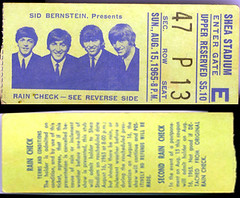
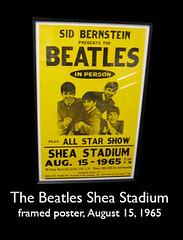

NYROCK:
Did you bring the Stones to America?
SID:
Yes, I promoted their first five concerts, but nobody cares or remembers.
NYROCK:
Whose idea was it for the Beatles to arrive in an armored car?
SID:
Not sure, but I think it was the idea of the police.
NYROCK:
How come there are no more concerts at Shea or Yankee stadiums?
SID:
It is super expensive, plus the insurance and the unions.
NYROCK:
Where is the actual stage that was used at the Shea shows?
SID:
It is probably in one of the storage rooms at Shea.
NYROCK:
Will the Shea concerts ever be released on video or DVD?
SID:
CBS showed a film of the concert. Where there's money, something will eventually resurface. I gave the film away to Sullivan, who asked if I could tape it in the first place. Whoever knew then what something would be worth now. My hunch is that a film of the performance will someday come out.
NYROCK:
What did you like better, the first or second Shea show?
SID:
I liked both. I was so caught up in the excitement and the fact that nobody got injured.
NYROCK:
Do you remember the music?
SID:
The first show I couldn't hear and I was sitting right under the stage with Brian Epstein. For the second Shea show, I could hear the music.
NYROCK:
Whose idea was it to flash "The Rascals Are Coming" on the billboard at Shea before the Beatles went on?
SID:
Mine, it worked. I am a promoter.
NYROCK:
Why did the Beatles play such short sets of like 30 - 35 minutes? Could you have got them to play longer?
SID:
We didn't think about it. It was crazy. There was no contract on the amount of time played. Everything with Brian Epstein was a verbal handshake over the phone. He was very trustworthy.
NYROCK:
What were the individual Beatles' reactions to your attempted reunions of 1976 and 1979?
SID:
John called me for more details in 1979 and my secretary hand delivered the details over to their offices at the Dakota. The reaction that appeared in the Palace Herald Tribune by Paul stated something to the effect that "It's more weight than our shoulders can carry." John said in his Playboy interview in 1980 about the attempted reunion: "That's Sid doing Al Jolsen on bended knee with his Yiddish schmaltz."
NYROCK:
Were you hurt by Lennon's remarks in Playboy magazine?
SID:
I got sick when I read that. I was so upset, but then I saw him on Columbus Avenue and realized that was John having a moment with his dry cynicism.
NYROCK:
Do you still talk to any of the Beatles?
SID:
Not really, I saw Ringo a few years ago at Radio City with the All-Starr band.
NYROCK:
Do you think the remaining Beatles will ever reunite?
SID:
My hunch is no.
NYROCK:
I hear you are friends with Lenny Kravitz's dad?
SID:
Lenny's father Sy and I went out for pizza the other day. We have been friends for years and my sons went to school with Lenny at P.S. 6. Lenny was over my place a few months ago and said, "Sid, I would like to do a concert with you that is advertised as Sid Bernstein presents Lenny Kravitz." His father said he wants to do it. I'm thinking about bringing him to Carnegie Hall.
NYROCK:
How do you account for the Beatles continued popularity?
SID:
They are part of the fabric of our souls. They are almost imbedded in our genes. We're not going to let them forget that we still love them.
NYROCK:
What is your favorite song by the Beatles as a group or solo artists?
SID:
Imagine, it's how I feel about the world. My second most favorite song is Beautiful Boy.
NYROCK:
Do you have one favorite Beatle moment?
SID:
When I was sitting with John at Carnegie Hall for a concert with the reggae artist Jimmy Cliff and John said to me, "You know Sid, at Shea I saw the top of the mountain," and I said, "John, so did I."
NYROCK:
What do you think about the Delsner/Slater monopoly on concert promotion in the tri-state area? Do independent promoters stand a chance like you did in the sixties?
SID:
It is very tough. Every major market in every major city has relationships with certain acts and agents because they are like favorite customers and they have been presenting them for so long. How can a new guy get through to management or an agent? It's not just money; it's relationships.
NYROCK:
Do you think that is good or bad for music?
SID:
I think it stinks! I am not for monopolies. The mom-and-pop stores are vanishing.
NYROCK:
In your book, Not Just the Beatles, you refer to Jimi Hendrix, who performed at the Peace Concert at Madison Square Garden, as an incorrigible druggie. What were your views on the hippie counter-culture of the time?
SID:
I hated it and still do.
NYROCK:
What did you think when the Beatles turned hippie?
SID:
I was disappointed.
NYROCK:
What about Lennon's early seventies activism against the Vietnam War?
SID:
It was good. It was pro-life. I would have joined him. I did two things for peace which are mentioned in the book: The Winter Festival for Peace which was against the war in Vietnam and the Summer Festival for Peace in Shea Stadium.
NYROCK:
Do you think benefits and rock music mix?
SID:
It works for the politicians. It shows that they relate to young people. I don't think it works for the acts though. My favorite politician is Bill Bradley.
NYROCK:
What part of your legacy are you most proud of?
SID:
My children and my relationship with them and the fact that I never let my business run me. There's got to be more than the bottom line being the buck. It's got to be more than that, especially since we have such a platform in the concert business. For example, Bethel '94, which revolved around civility and planting seeds.
NYROCK:
Future plans?
SID:
I am thinking about something at Shea but I don't have the performers yet. I'd like to hit one more home run at Shea! Someone said they would like to make a movie of the book and have Robin Williams star as me, but I think I am more the Al Pacino type.
NYROCK:
Best hot dogs in NYC?
SID:
It's a matter of opinion. Second Avenue Deli, when you get them off the griddle right, not too overdone, not underdone. I like them juicy plump, well done, but not overdone.
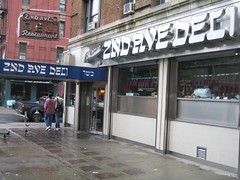


NYROCK:
How about Gray's Papaya? The gassiest dogs in town! They just increased their recession special of two hot dogs and a papaya drink to $2.50.
SID:
The one at 86th Street, I love it.
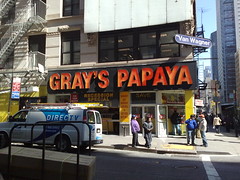
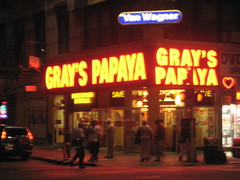

NYROCK:
Best pizza in NYC?
SID:
Patsy's at First Avenue between 117th and 118th Streets, I have been going there for more years than I care to admit. I went there when I was a kid. They have the original coal ovens, which make all the difference, plus their ingredients are superb as well.
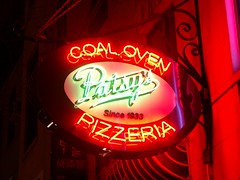
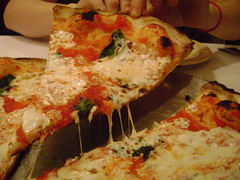
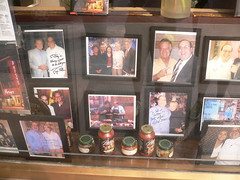
Not Just the Beatles . . . The story of how legendary impresario Sid Bernstein brought the Beatles to America, and his association with show business greats of our time. As told to Arthur Aaron. may be purchased here:
www.amazon.com/Not-Just-Beatles-Autobiography-Bernstein/dp/0970610106/ref=sr_1_1?ie=UTF8&s=books&qid=1212970434&sr=1-1
www.nyrock.com/interviews/2001/sid_int.asp
nyrock.com
by Glyn Emmerson
May 2001
Sid Bernstein – the man who brought The Beatles to America – has a new book out titled Not Just the Beatles, detailing his life from within and without his long career in the music business.

Back before MTV, when artists actually performed rather than lip-syncing their shows to pre-recorded music, Sid was the first person to stage a major rock act at a stadium. The roster of bands he has promoted is a virtual who’s who of popular music in the twentieth century: Judy Garland, Tony Bennett, the Rascals, the Rolling Stones, the Blues Project, Hendrix, Joplin, Sinatra, Grand Funk Railroad, Bay City Rollers, Laura Branigan, to name a few.
From losing his virginity on the grassy knolls of Prospect Park in Brooklyn (it’s in the book!) to battling the Germans in World War II, Sid seems the proverbial man who has done it all. Gentle, mild mannered and ever so courteous, he has fathered six children, brought the British invasion to America, and much more (Sid’s current projects include fund raising for cancer research).
Not Just the Beatles is a breezy, conversational read, in which the stories flow as if you were hearing them from an old friend. A rapturous mix of musical adventures, the book glows with an underlying sense of optimism, whimsical love and caring for the world.
NY Rock’s Glyn Emmerson sat down with Sid over a few cups of apple cider and chatted about all things Sid, and, of course, the Beatles.
NYROCK:
How did you find out about the Beatles?
SID:
In 1962, I was taking a course at the New School for Social Research on 12th Street where I now teach a course on the music biz. For the course, the professor mentioned a bunch of books for us to get as well as some English papers to read. I didn't have time to read the books, [so I picked] up the English newspaper that was a very thin airmail edition. This was the right time to be reading an English newspaper. So here I am reading little stories about this group from Liverpool that is causing a lot of hysteria. By the end of the course, I was so Beatle-ized by what I read, even though I did not hear a note, I said, gotta get 'em. I'd been promoting concerts at the Brooklyn Paramount, where I took over from Alan Freed because he got into a lot of trouble for payola. Murray the K was my MC and they were hot shows.
I called Brian Epstein at home, who was still living in Liverpool, got him on the phone and tried to sell him on the idea of the Beatles coming over here. He said, "America is not playing our records. I don't want my boys to play to an empty house. We are superstars here." He told me I was the first American to call him, even before Ed Sullivan. I won him over by saying, 'I'll put your boys in Carnegie Hall."

I did not hear the Beatles music until they started to hit radio and that was in September of 1963.
NYROCK:
First impression of the Beatles?
SID:
I thought they were great! I met them at the Plaza Hotel. They were ordinary nice guys who couldn't believe what was going on in America. They couldn't believe as they looked out the window of the Plaza that people were downstairs singing their songs and waving to them. They said we don't even have this sort of reaction in our own country.
NYROCK:
Did you help the Beatles get on "Ed Sullivan"?
SID:
Ed Sullivan had the band on Sunday; I had them on Wednesday, Lincoln's birthday. He put them on when he heard an American promoter had them for February 12, 1964. He put them on three days before Carnegie, on February 9th. Talk about good luck! People thought I was a genius. He also got caught up in the frenzy and signed them to his show before they had a hit, as I did.

The Beatles on The Ed Sullivan Show.
NYROCK:
Was that the first rock concert at Carnegie Hall?
SID:
Yes, they weren't too happy about the Beatles. But they asked me not to come back after the Rolling Stones played Carnegie.
NYROCK:
Were the Carnegie Hall shows recorded?
SID:
No.

Paul McCartney and Sid Bernstein. Photo by Steve Sherman taken at
Carnegie Hall after a performance of Paul's Liverpool Oratorio, 1991
NYROCK:
What was the difference between the Rolling Stones and the Beatles crowds?
SID:
The physical reactions of the crowd. The Beatles crowd was pretty little girls and kids. For the Rolling Stones, people were getting on top of their chairs.
NYROCK:
How did you get the Beatles to play Shea Stadium?
SID:
The manager of the ticket window at Carnegie Hall told me I should have brought the Beatles for 30 days instead of the 2 shows at Carnegie. He gave me the idea for the Shea show. I had discussed with Brian the possibility of the band playing the old Madison Square Garden after the Carnegie shows and actually took him to the Garden and he said no. By the time I booked the Beatles into Shea, I had already done the British Invasion (Beatles, Stones, Dave Clark Five, Kinks).



NYROCK:
Did you bring the Stones to America?
SID:
Yes, I promoted their first five concerts, but nobody cares or remembers.
NYROCK:
Whose idea was it for the Beatles to arrive in an armored car?
SID:
Not sure, but I think it was the idea of the police.
NYROCK:
How come there are no more concerts at Shea or Yankee stadiums?
SID:
It is super expensive, plus the insurance and the unions.
NYROCK:
Where is the actual stage that was used at the Shea shows?
SID:
It is probably in one of the storage rooms at Shea.
NYROCK:
Will the Shea concerts ever be released on video or DVD?
SID:
CBS showed a film of the concert. Where there's money, something will eventually resurface. I gave the film away to Sullivan, who asked if I could tape it in the first place. Whoever knew then what something would be worth now. My hunch is that a film of the performance will someday come out.
NYROCK:
What did you like better, the first or second Shea show?
SID:
I liked both. I was so caught up in the excitement and the fact that nobody got injured.
NYROCK:
Do you remember the music?
SID:
The first show I couldn't hear and I was sitting right under the stage with Brian Epstein. For the second Shea show, I could hear the music.
NYROCK:
Whose idea was it to flash "The Rascals Are Coming" on the billboard at Shea before the Beatles went on?
SID:
Mine, it worked. I am a promoter.
NYROCK:
Why did the Beatles play such short sets of like 30 - 35 minutes? Could you have got them to play longer?
SID:
We didn't think about it. It was crazy. There was no contract on the amount of time played. Everything with Brian Epstein was a verbal handshake over the phone. He was very trustworthy.
NYROCK:
What were the individual Beatles' reactions to your attempted reunions of 1976 and 1979?
SID:
John called me for more details in 1979 and my secretary hand delivered the details over to their offices at the Dakota. The reaction that appeared in the Palace Herald Tribune by Paul stated something to the effect that "It's more weight than our shoulders can carry." John said in his Playboy interview in 1980 about the attempted reunion: "That's Sid doing Al Jolsen on bended knee with his Yiddish schmaltz."
NYROCK:
Were you hurt by Lennon's remarks in Playboy magazine?
SID:
I got sick when I read that. I was so upset, but then I saw him on Columbus Avenue and realized that was John having a moment with his dry cynicism.
NYROCK:
Do you still talk to any of the Beatles?
SID:
Not really, I saw Ringo a few years ago at Radio City with the All-Starr band.
NYROCK:
Do you think the remaining Beatles will ever reunite?
SID:
My hunch is no.
NYROCK:
I hear you are friends with Lenny Kravitz's dad?
SID:
Lenny's father Sy and I went out for pizza the other day. We have been friends for years and my sons went to school with Lenny at P.S. 6. Lenny was over my place a few months ago and said, "Sid, I would like to do a concert with you that is advertised as Sid Bernstein presents Lenny Kravitz." His father said he wants to do it. I'm thinking about bringing him to Carnegie Hall.
NYROCK:
How do you account for the Beatles continued popularity?
SID:
They are part of the fabric of our souls. They are almost imbedded in our genes. We're not going to let them forget that we still love them.
NYROCK:
What is your favorite song by the Beatles as a group or solo artists?
SID:
Imagine, it's how I feel about the world. My second most favorite song is Beautiful Boy.
NYROCK:
Do you have one favorite Beatle moment?
SID:
When I was sitting with John at Carnegie Hall for a concert with the reggae artist Jimmy Cliff and John said to me, "You know Sid, at Shea I saw the top of the mountain," and I said, "John, so did I."
NYROCK:
What do you think about the Delsner/Slater monopoly on concert promotion in the tri-state area? Do independent promoters stand a chance like you did in the sixties?
SID:
It is very tough. Every major market in every major city has relationships with certain acts and agents because they are like favorite customers and they have been presenting them for so long. How can a new guy get through to management or an agent? It's not just money; it's relationships.
NYROCK:
Do you think that is good or bad for music?
SID:
I think it stinks! I am not for monopolies. The mom-and-pop stores are vanishing.
NYROCK:
In your book, Not Just the Beatles, you refer to Jimi Hendrix, who performed at the Peace Concert at Madison Square Garden, as an incorrigible druggie. What were your views on the hippie counter-culture of the time?
SID:
I hated it and still do.
NYROCK:
What did you think when the Beatles turned hippie?
SID:
I was disappointed.
NYROCK:
What about Lennon's early seventies activism against the Vietnam War?
SID:
It was good. It was pro-life. I would have joined him. I did two things for peace which are mentioned in the book: The Winter Festival for Peace which was against the war in Vietnam and the Summer Festival for Peace in Shea Stadium.
NYROCK:
Do you think benefits and rock music mix?
SID:
It works for the politicians. It shows that they relate to young people. I don't think it works for the acts though. My favorite politician is Bill Bradley.
NYROCK:
What part of your legacy are you most proud of?
SID:
My children and my relationship with them and the fact that I never let my business run me. There's got to be more than the bottom line being the buck. It's got to be more than that, especially since we have such a platform in the concert business. For example, Bethel '94, which revolved around civility and planting seeds.
NYROCK:
Future plans?
SID:
I am thinking about something at Shea but I don't have the performers yet. I'd like to hit one more home run at Shea! Someone said they would like to make a movie of the book and have Robin Williams star as me, but I think I am more the Al Pacino type.
NYROCK:
Best hot dogs in NYC?
SID:
It's a matter of opinion. Second Avenue Deli, when you get them off the griddle right, not too overdone, not underdone. I like them juicy plump, well done, but not overdone.



NYROCK:
How about Gray's Papaya? The gassiest dogs in town! They just increased their recession special of two hot dogs and a papaya drink to $2.50.
SID:
The one at 86th Street, I love it.



NYROCK:
Best pizza in NYC?
SID:
Patsy's at First Avenue between 117th and 118th Streets, I have been going there for more years than I care to admit. I went there when I was a kid. They have the original coal ovens, which make all the difference, plus their ingredients are superb as well.



Not Just the Beatles . . . The story of how legendary impresario Sid Bernstein brought the Beatles to America, and his association with show business greats of our time. As told to Arthur Aaron. may be purchased here:
www.amazon.com/Not-Just-Beatles-Autobiography-Bernstein/dp/0970610106/ref=sr_1_1?ie=UTF8&s=books&qid=1212970434&sr=1-1
www.nyrock.com/interviews/2001/sid_int.asp
